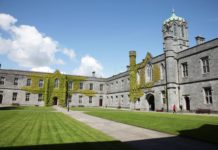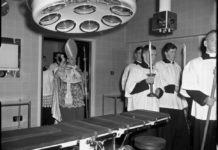Drawing on documents discovered in the archives of the Dublin Unitarian Church – that traces its history back to the Dissenter community – author and trade union activist Fergus Whelan provides an insight into the largely forgotten history of Ireland’s first generation of radical republicans.
Irish republicanism came into being in the late 18th century with the building of the United Irish movement. At the core of this revolutionary organisation were the Dissenter, or Unitarian, communities of Dublin and Belfast.
The Dublin Unitarian Church was the cradle of the Dublin Society of United Irishmen which was founded in October 1791. The cradle of the Belfast United Irishmen was its sister congregation which still meets at Rosemary St in Belfast.
William Drennan, the founder of the Dublin Society of United Irishmen, was a member of the Dublin congregation. He was the son of Rev. Thomas Drennan of Rosemary St and was born in the manse there in 1751. Drennan was an accomplished poet – he was the first to call our country ‘The Emerald Isle’. In researching the Unitarians’ republican tradition I have drawn upon Drennan’s correspondence and precious documents such as the marriage certificate of the United Irish leader Robert Emmet’s sister, Mary Anne.
Although the Emmet family were themselves members of the Established (Anglican) Church of Ireland, Mary Anne Emmet married Robert Holmes in the Dublin Unitarian Church (then located at Great Strand St) on 21st September 1799. Robert Holmes was a radical lawyer and long standing member of the congregation. Mary Anne Emmet, unusually for women of her time, was a political writer. She is believed to have published two pamphlets condemning the Act of Union.
The marriage certificate (below) names five people that we can be certain were present at the wedding. With the happy couple were their witnesses Robert Emmet senior, Robert Emmet junior, John Patten, and the presiding minister Rev. John Moody.
The wedding was a secret affair. Holmes was known by his fellow lawyers to have been in sympathy with the 1798 rebellion. He was being shunned on the legal circuit and was finding it difficult to get work. If it was widely known that he was marrying into Dublin’s most notorious republican family, his legal career would have suffered further damage.
There was another reason for the secrecy. Robert Emmet junior had had to abandon his brilliant academic career in Trinity College the previous year when Lord Clare summoned him to account for his treasonable activities there. Since then, Robert had been in hiding and six months before the wedding a warrant had been issued for his arrest. Emmet was now in the revolutionary underground where he was to remain until his capture and execution four years later.
It is hard to overstate the degree of fear that was stalking Ireland when this wedding was taking place. The rebellion in Wexford, Wicklow, Kildare, Antrim and Down had been crushed with great severity. The fighting was over but the government’s reign of terror was in full swing.
A renegade former member of the Dublin Unitarian Church, Robert Stewart – the infamous Viscount Castlereagh – was directing the Government’s terror campaign against the defeated rebels. Following the rebellion, Castlereagh hunted down guilty and innocent alike, executing many. No less than four Unitarian Ministers died as his victims.
The third witness to the wedding was John Patten a close friend of Robert Emmet and a long standing member of the Dublin Unitarian congregation. John Patten lived in the Emmets’ home at St Stephen’s Green and participated in secret political meetings there with Robert prior to 1798, and after the failed rebellion undertook missions on behalf of the United Irishmen.
Less than four years after the wedding, in the aftermath of Robert Emmet’s own failed 1803 rebellion in Dublin, John Patten and Robert Holmes were arrested on suspicion of involvement and lodged in Kilmainham gaol. The authorities believed that John Patten could give them useful information if they could break his spirit. They engaged in a cynical piece of psychological barbarity to achieve this end. After they took Robert Emmet out to be publically mutilated and executed they moved John Patten into Emmet’s cell and he was forced to use the same bedding as his murdered friend. Patten was made of stern stuff, however, and in spite of many offers of freedom in return for information he told them nothing. Though charged with no crime John Patten spent three years in jail.
The Dublin Unitarian Church documents also hold indications of the resentment which many felt at the behaviour of William Plunkett, the prosecutor at Robert Emmet’s trial. Plunkett’s father was a Unitarian minister and Plunkett himself had defended republican rebels when they were sentenced to death for rebellion in 1798. By the time Emmet came to trial Plunkett had changed sides and was anxious to please his new masters in Dublin Castle.
When Plunkett rose to sum up for the prosecution he gratuitously berated and insulted Emmet before the inevitable verdict and death sentence. He sneered at Emmet’s provisional government of ‘the bricklayer, the baker and the old clothes man’. His invective annoyed Emmet and for the only time during the trial, his resolute demeanour was shaken.
Plunkett with the sarcasm and arrogant conceit so common to members of his profession observed that Emmet’s officer Michael Quigley, the hero and successful rebel captain of ’98, ‘had abandoned the lowly trade of the bricklayer to become the framer of constitutions and the subvertor of empires’. I am a bricklayer and the trade has run in the Whelan family for generations. Two hundred and six years on, Plunkett’s crass arrogance still offends me. For Plunkett and his Tory masters the worst crime of the United Irishmen had been to suggest that working men have as much a stake in human freedom and political liberty as their so-called betters.
The Dublin Unitarians today who are interested in politics are peace campaigners, supporters of human rights and social justice, they support gay and lesbian rights, and are anti-racist, liberal, and tolerant. The old Unitarians were anti-sectarian democrats. They espoused absolute liberty of conscience in religious matters. They welcomed the American and French Revolutions because they believed people should be free citizens rather than the subjects of a tyrant. They fought against the slave trade and I believe the first published attack on Slavery was written by the great Francis Hutchison, Professor of Philosophy at Glasgow, but for ten years a member of the Dublin Unitarian Congregation.
Typical of the old Unitarian clergy was the martyr for liberty in Scotland Rev. Thomas Fysh Palmer who died in the penal colonies because he distributed Tom Paine’s Rights of Man to weavers in Dundee. The Rev. Palmer and his fellow martyr Thomas Muir of Hunters Hill had been good friends of Dublin Unitarian Church congregation member Archibald Hamilton Rowan.
Rowan went to Scotland to support them at their trial in 1793. The contemporary Scottish folk singer Dick Gaughan captured why what happened at the end of the eighteenth century should matter to us today when he sang of Muir and the Rev Palmer.
“These are names that every man and woman ought to know
When you’re called for jury service when your name is drawn by lot
When you vote in an election when you freely voice your thought
Don’t take these things for granted for dearly were they bought
Remember Thomas Muir of Hunters Hill”
The Protestant Dissenters of 18th century Dublin and Belfast sought civil and religious liberty, an end to arbitrary power, and the dawn of liberty for humankind. That is why they established the Society of United Irishmen.
The Protestant Dissenters of Dublin these days prefer the term Unitarian. But the Dublin Dissenters remain proud of their radical egalitarian and democratic history, their association with the United Irishmen and with ‘Bold Robert Emmet’ and his family.
Fergus Whelan’s Dissent Into Treason, a study of the influence of Radical Protestant Dissent in the Society of United Irishmen, will be published this autumn.






